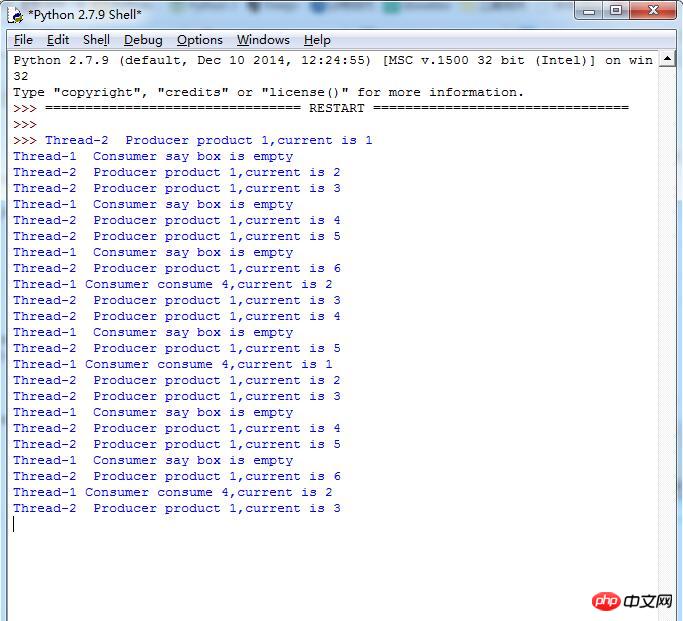这篇文章主要介绍了python条件变量之生产者与消费者操作,结合具体实例形式分析了Python条件变量的概念、原理、及线程操作的相关技巧,需要的朋友可以参考下
本文实例讲述了python条件变量之生产者与消费者操作。分享给大家供大家参考,具体如下:
互斥锁是最简单的线程同步机制,面对复杂线程同步问题,Python还提供了Condition对象。Condition被称为条件变量,除了提供与Lock类似的acquire和release方法外,还提供了wait和notify方法。线程首先acquire一个条件变量,然后判断一些条件。如果条件不满足则wait;如果条件满足,进行一些处理改变条件后,通过notify方法通知其他线程,其他处于wait状态的线程接到通知后会重新判断条件。不断的重复这一过程,从而解决复杂的同步问题。
可以认为Condition对象维护了一个锁(Lock/RLock)和一个waiting池。线程通过acquire获得Condition对象,当调用wait方法时,线程会释放Condition内部的锁并进入blocked状态,(但实际上不会block当前线程)同时在waiting池中记录这个线程。当调用notify方法时,Condition对象会从waiting池中挑选一个线程,通知其调用acquire方法尝试取到锁。
Condition对象的构造函数可以接受一个Lock/RLock对象作为参数,如果没有指定,则Condition对象会在内部自行创建一个RLock。
线程同步经典问题----生产者与消费者问题可以使用条件变量轻松解决。
import threading
import time
class Producer(threading.Thread):
def init(self):
threading.Thread.init(self)
def run(self):
global count
while True:
con.acquire()
if count <20:
count += 1
print self.name," Producer product 1,current is %d" %(count)
con.notify()
else:
print self.name,"Producer say box is full"
con.wait()
con.release()
time.sleep(1)
class Consumer(threading.Thread):
def init(self):
threading.Thread.init(self)
def run(self):
global count
while True:
con.acquire()
if count>4:
count -=4
print self.name,"Consumer consume 4,current is %d" %(count)
con.notify()
else:
con.wait()
print self.name," Consumer say box is empty"
con.release()
time.sleep(1)
count = 0
con = threading.Condition()
def test():
for i in range(1):
a = Consumer()
a.start()
for i in range(1):
b =Producer()
b.start()
if name=='main':
test()上面的代码假定消费者消费的比较快,输出结果为:

以上是python Condition对象之生产者与消费者操作的代码实例的详细内容。更多信息请关注PHP中文网其他相关文章!
 2小时的Python计划:一种现实的方法Apr 11, 2025 am 12:04 AM
2小时的Python计划:一种现实的方法Apr 11, 2025 am 12:04 AM2小时内可以学会Python的基本编程概念和技能。1.学习变量和数据类型,2.掌握控制流(条件语句和循环),3.理解函数的定义和使用,4.通过简单示例和代码片段快速上手Python编程。
 Python:探索其主要应用程序Apr 10, 2025 am 09:41 AM
Python:探索其主要应用程序Apr 10, 2025 am 09:41 AMPython在web开发、数据科学、机器学习、自动化和脚本编写等领域有广泛应用。1)在web开发中,Django和Flask框架简化了开发过程。2)数据科学和机器学习领域,NumPy、Pandas、Scikit-learn和TensorFlow库提供了强大支持。3)自动化和脚本编写方面,Python适用于自动化测试和系统管理等任务。
 您可以在2小时内学到多少python?Apr 09, 2025 pm 04:33 PM
您可以在2小时内学到多少python?Apr 09, 2025 pm 04:33 PM两小时内可以学到Python的基础知识。1.学习变量和数据类型,2.掌握控制结构如if语句和循环,3.了解函数的定义和使用。这些将帮助你开始编写简单的Python程序。
 如何在10小时内通过项目和问题驱动的方式教计算机小白编程基础?Apr 02, 2025 am 07:18 AM
如何在10小时内通过项目和问题驱动的方式教计算机小白编程基础?Apr 02, 2025 am 07:18 AM如何在10小时内教计算机小白编程基础?如果你只有10个小时来教计算机小白一些编程知识,你会选择教些什么�...
 如何在使用 Fiddler Everywhere 进行中间人读取时避免被浏览器检测到?Apr 02, 2025 am 07:15 AM
如何在使用 Fiddler Everywhere 进行中间人读取时避免被浏览器检测到?Apr 02, 2025 am 07:15 AM使用FiddlerEverywhere进行中间人读取时如何避免被检测到当你使用FiddlerEverywhere...
 Python 3.6加载Pickle文件报错"__builtin__"模块未找到怎么办?Apr 02, 2025 am 07:12 AM
Python 3.6加载Pickle文件报错"__builtin__"模块未找到怎么办?Apr 02, 2025 am 07:12 AMPython3.6环境下加载Pickle文件报错:ModuleNotFoundError:Nomodulenamed...
 如何提高jieba分词在景区评论分析中的准确性?Apr 02, 2025 am 07:09 AM
如何提高jieba分词在景区评论分析中的准确性?Apr 02, 2025 am 07:09 AM如何解决jieba分词在景区评论分析中的问题?当我们在进行景区评论分析时,往往会使用jieba分词工具来处理文�...
 如何使用正则表达式匹配到第一个闭合标签就停止?Apr 02, 2025 am 07:06 AM
如何使用正则表达式匹配到第一个闭合标签就停止?Apr 02, 2025 am 07:06 AM如何使用正则表达式匹配到第一个闭合标签就停止?在处理HTML或其他标记语言时,常常需要使用正则表达式来�...


热AI工具

Undresser.AI Undress
人工智能驱动的应用程序,用于创建逼真的裸体照片

AI Clothes Remover
用于从照片中去除衣服的在线人工智能工具。

Undress AI Tool
免费脱衣服图片

Clothoff.io
AI脱衣机

AI Hentai Generator
免费生成ai无尽的。

热门文章

热工具

PhpStorm Mac 版本
最新(2018.2.1 )专业的PHP集成开发工具

ZendStudio 13.5.1 Mac
功能强大的PHP集成开发环境

Atom编辑器mac版下载
最流行的的开源编辑器

SecLists
SecLists是最终安全测试人员的伙伴。它是一个包含各种类型列表的集合,这些列表在安全评估过程中经常使用,都在一个地方。SecLists通过方便地提供安全测试人员可能需要的所有列表,帮助提高安全测试的效率和生产力。列表类型包括用户名、密码、URL、模糊测试有效载荷、敏感数据模式、Web shell等等。测试人员只需将此存储库拉到新的测试机上,他就可以访问到所需的每种类型的列表。

WebStorm Mac版
好用的JavaScript开发工具





